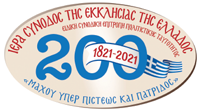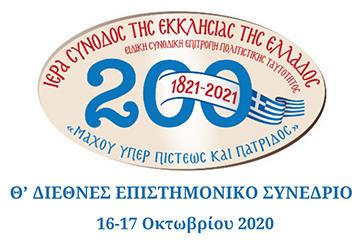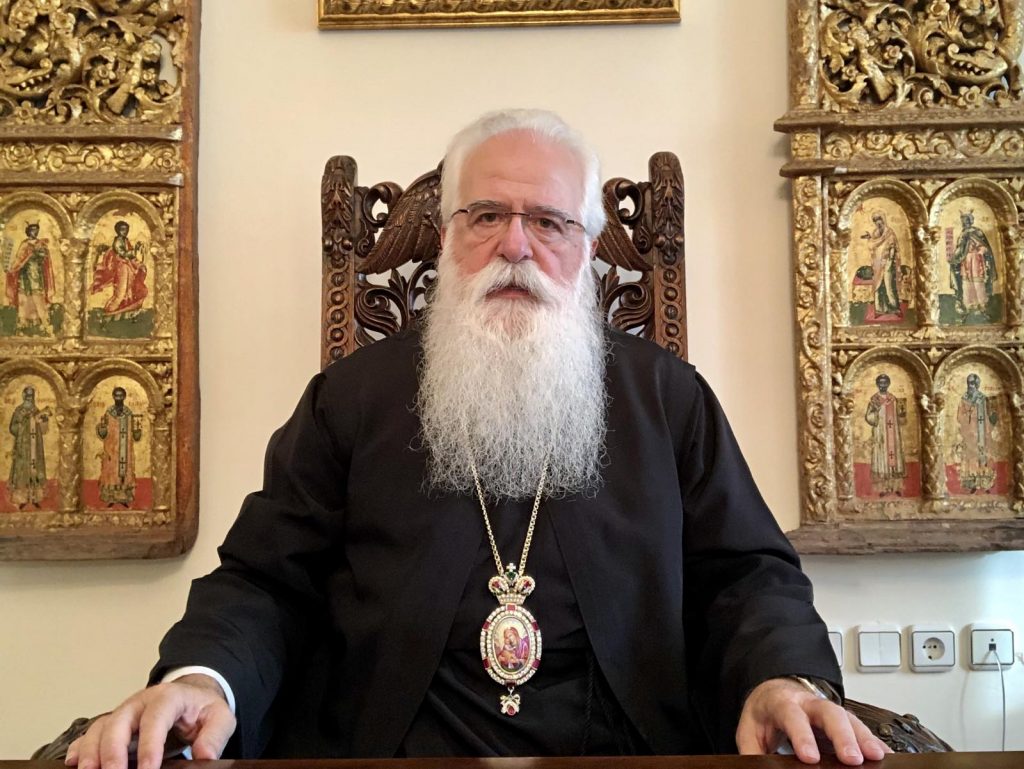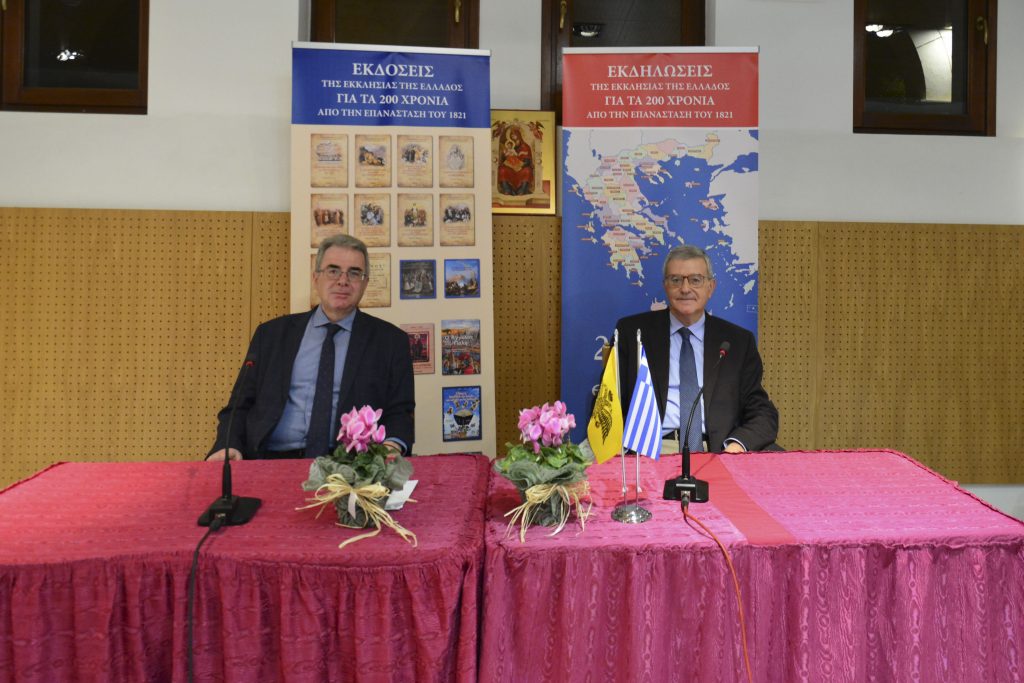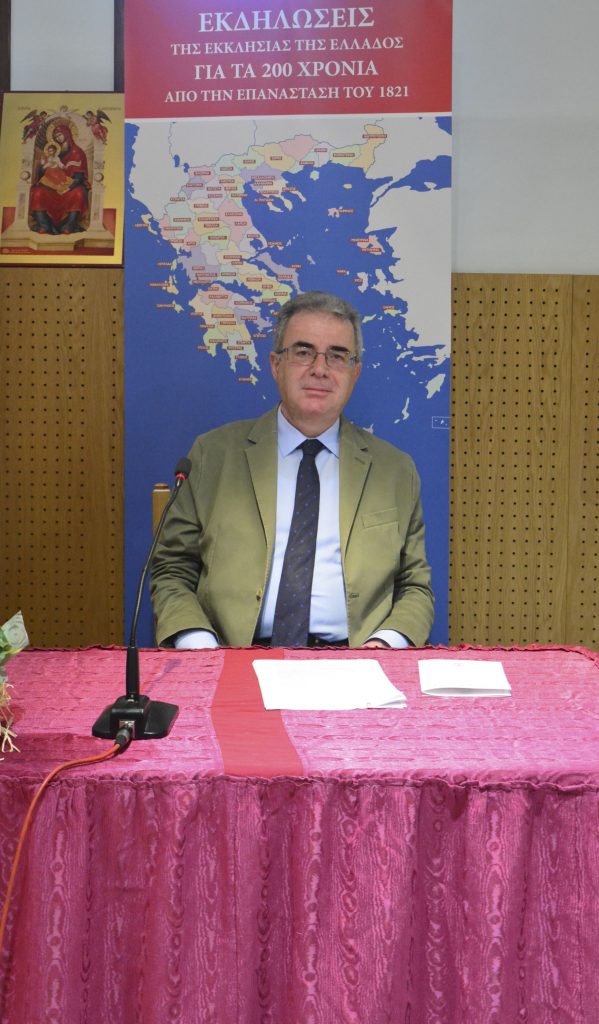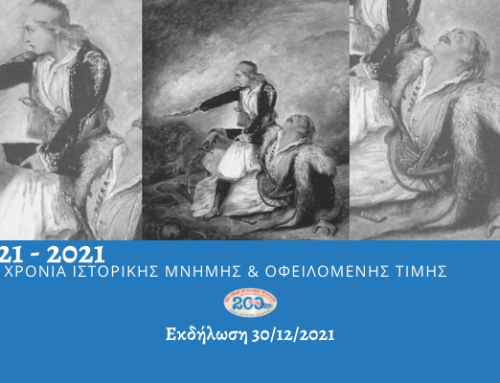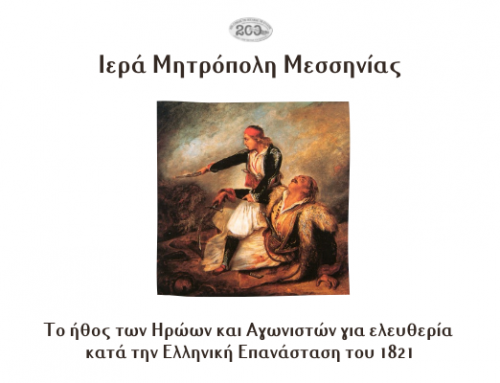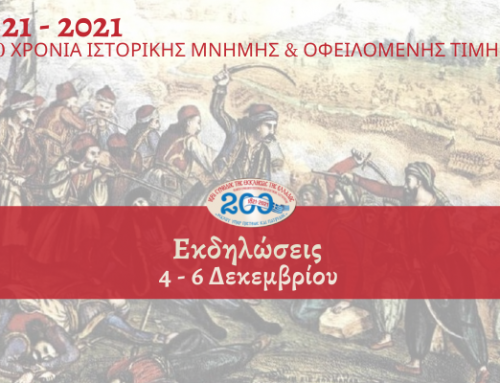October 17, 2020: Completion of the proceedings of the IX International Scholarly Conference
Saturday, October 17, 2020, saw the completion of the proceedings of the IX International Scholarly Conference which was organized online by the Holy Synod of the Church of Greece through the Special Synodic Committee of Cultural Identity, in the Synodic Palace of the Church of Greece, on the topic of “The Finances of the Struggle – Achieving the Greek Independence and having it recognized”. This Conference is part of a cycle of ten Scholarly Conferences on the general topic “1821-2021: 10 Scholarly Conferences in honour of the 200th Anniversary of the Greek Revolution”.
During these days, five session took place, at the end of each questions were submitted by listeners and participants and, as a result, a constructive dialogue was developed. On Friday, October 16, in his opening greeting, HB Ieronymos II, Archbishop of Athens and all Greece, emphasized the following : “Why does our Church study and highlight these parameters of the Struggle, at this nationally crucial conjuncture? First of all, because the modern-day absolute attachment to financial goods distorts the legitimate pursuit of virtue into an inconsiderate hunt for ensuring everything for the individual. In other terms, in our everyday lives, we forget the truth of Christ that “man shall not live by bread alone” (Luke, 4,4-5).
Secondly, amidst the international political instability which encircles our country and the lack of a clear orientation globally, because the problematics of the present illuminate the life-bearing value of the past and our ancestors. Therefore, the references that I am sure will be made during our Conference to the emblematic personality of the Corfiot Governor constitute a tribute of honour to his moral integrity, within which theory and practice complement one another mutually”.
Later in his message His Beatitude stated that “the Church of Greece has prepared further events, whether of worship, or scholarly, cultural, artistic ones, which will be presented throughout the anniversary year 2021 by the Holy Synod, the Holy Archdiocese of Athens and local Holy Metropolitanates. Our aim is to help Greek men and women, our youth in particular, to utilize the lessons of the course of the nation so that we all of us may search for higher possibilities on the horizon of our lives. […] May I wholeheartedly thank the academics and University teachers, the researchers as well as the Delegates of the Patriarchate of Jerusalem and of the Holy Athonite State, who are participating in the Conference, and those who organized it”.
Next, Most Rev. Metropolitan Ignatios of Demetrias and Almyros, Chairman of the Special Synodic Committee of Cultural Identity, attending through an online connection, noted, inter alia, the following : “Occasionally, contemporary Greek history has fallen victim to ideological interpretations and misinterpretations. These Conferences offer the opportunity to diverse voices to be heard. We do not pursue unanimity or monotony. However, we are confident that all participants will anchor their papers safely in historic sources and will help us approach historic events with respect for truth and with a rich bibliographical documentation”.
In the first Session, on the topic of “The cost of the Revolution”, chaired by the Learned Professor Emmanuel Varvounis of the Democritean University of Thrace and Chairman of the Scholarly Committee of the Special Synodic Committee of Cultural Identity, the following participants spoke of the following subjects : The first participant, the Learned Mr Gheorghios Poukamissas, developed the subject “The finances of the Society of Friends”. Mr Poukamissas stated, inter alia, that “at his initiation, Panaghiotis Sekeris offered the amount of 10,000 grossi. Finally, the money chests of big merchants were opening. The other significant sponsors of the Society of Friends were Thracians from Mesembria of the Black Sea, the Koumbaroi brothers, Stamatios Alexandros, big merchant in Odessa, and Kyriakos, merchant in Constantinople. […] The support of Ioannis Varvakis, settled in Russia since many years previously, seems to have been substantial […]”.
The second paper, presented jointly by the Learned participants Mr Nikolaos Tombros and Mr Nikolaos Kanellopoulos, was on the subject of “Feeding and paying the armed bands of rebelling Greeks (1821-1829). Approaches to financial magnitudes”. The speakers emphasized the fact that “in the first year of the Revolution, the absence of a central administration which would have taken upon itself to organize the Greek Liberation Struggle and to raise the necessary funds for its continuation was covered by the fighters’ love of their fatherland and their bravery and enthusiasm. […] Moreover, their needs in food were covered mainly by own funds of local populations or prizes of war”. The third participant, the Learned Ms Katerina Galani, presented a paper on “Ships as financial and social assets during the Greek Revolution” and stated that “on the eve of the Greek Revolution, as has been documented by recent research, Greeks had become the most important carriers in the Eastern Mediterranean. The geographic spread of the Greek commercial network, as described in an extract from the Archives of the island of Hydra, is very expanded. […] It is a network reaching as far as India […]”.
The fourth participant, the Rev. Monk Brother Cosmas of the Monastery of Simon’s Rock (“Simonopetra” in Greek), Chief Secretary of the Holy Community of Mount Athos, presented a paper on “The financial repercussions for Mount Athos from its involvement in the 1821 Revolution”. The contributor pointed out that “Emmanuel Pappas, a merchant and banker from Serres, possibly sent by the Society of Friends, arrived at Mount Athos in order to contribute to the uprising of Macedonia, in all likelihood in February of 1821, bringing money from his personal property and weapons for the needs of the endeavour. He remains on the Mount deliberating and inactive until May. Meanwhile, in order to avert a rebellion, the ruler of Thessaloniki, Yusuf Bey, arrested the headmen of the villages of Halkidiki, the stewards of the dependencies of Mount Athos and several of the prominent citizens of Thessaloniki and locked them up in prison as hostages and guarantees of peace […]”.
In the second Session, on the topic of “Public finances and funding of the Struggle”, chaired by Mr Constantinos Holevas, Political Scientist and Historian, the following participants took the floor: First, the Learned Ms Sophia Karimbali developed the subject “The revenues of the risen nation of 1821 as main sources of financial empowerment of the Struggle of Independence. Failure to utilize them, profiteering, and abuses”. The speaker emphasized, inter alia, the fact that “the part played by the Greek colonies abroad during the Ottoman Rule and mainly in the years of the Revolution was a significant catalyst, because these crucial commercial and spiritual hearths of Hellenism provided invaluable assistance and contributed to the Struggle in every manner, mainly through their financial support in economically critical periods”. The second speaker, the Learned Mr Evanghelos Venizelos, presented the subject of “The contradiction of sovereign debt: the ‘loans of Independence’ as a genetic burden of the modern Greek state and an act of recognition of its sovereignty”. He underlined, inter alia, the fact that “the loans of Independence are an act of foreign policy. […] The first loans were channeled to central administration and the armed forces, whereas the second one is concluded for the purpose of restructuring the first”. Finally, responding to a question put to him, he tellingly noted that “for the practices of that time, the terms of the loans were not unconscionable”.
The third participant, the Very Reverend Father Elias Drossinos, presented the subject of “The account of finding the first loan to the Greek people for the Liberation Struggle of 1821 (on the basis of unpublished material by the protagonists”. The speaker gave the following telling account: “In another letter from Marseilles to Athanassios Oikonomou in Odessa, he notes: ‘the French Government commanded the guards of its frontiers that they intercept, most of all, those wishing to proceed to Greece. As a result, can you imagine how I was perturbed by all this?’ […]”.
The fourth speaker, the Learned Mr Ioannis Sarantakis, presented the subject “Borrowing from England in order to attain the Independence of the nation”. The Learned participant noted: “The conclusion of the loan was considered a victory of the Anglophile party and was credited to Mavrogordatos and Koundouriotis who supported it. The contract of the loan was signed in London and the Loan Committee proceeded thither. The English signatories had already determined the lender, the amount and the terms, unbeknownst to the Loan Committee […]”.
The fifth contributor, the Learned Mr Theodoros Deveness, spoke of the subject of “The Accounting and Audit Council of the Kapodistriasn State. The first Greek administrative authority with a significant degree of independence of the Central Administration”. The Learned noted that, among its many other competences, the Council also had “the possibility of ordering inspections and summon Ministers themselves for further information. Every month it would inform the General Fund of the State by means of a detailed list of inflows and outlays, while, following the review of the accounts of each Ministry, it would issue an attestation — a “deed formally confirming full repayment”, as it was called.
Finally, the Learned Mr Christos Baloglou spoke of “The fiscal and tax policy of the Governor Ioannis Kapodistrias”. The speaker made reference, inter alia, to the fact that the first Governor of the country, “as Minister of the Septinsular Republic, resolved financial and social problems of the islands of Lefkas and Cephalonia, and gained experience in the exercise of financial policy. In order to find the financial means required, Kapodistrias sought radical solutions in view of addressing the entire problem of the country and of applying a development policy as well as provisional solutions in view of catering to the most urgent needs”.
16/10/2020 | A’ & B’ Session
On Saturday, October 17, 2020, the proceedings began with the first session on the topic of “The international aspect of the Greek issue. Politics and diplomacy”, chaired by the Learned Professor Demetrios Metallinos of the Ionian University, during which the following papers were presented: The Learned Mr Ioannis Mazis development the subject of “The geopolitical environment of the National Liberation Struggle of 1821”. In his paper, the speaker emphasized the fact that “following the second and final defeat of Napoleon the Great in Waterloo in 1815 and the ensuing elimination of a danger that would have been fatal to it, namely the appearance of a geopolitically unified European continental area under French hegemony, Great Britain devoted its attention over the greatest part of the 19th century to addressing the new rising major geopolitical rival, i.e. the continental Eurasian power of Russia, in order to prevent its probable descent to the Strait of the Dardanelles and its consequent exit to the Aegean a fact which would have led to the rise of that major land power to a state of naval power as well, with crucial implications for the position of England as Ruler of the Seas”. The second participant, the Learned Mr Ioannis Strimbis, spoke of “The internationalization of the Greek Revolution and International Law: Multiplicity of rules – unity of purpose”. Inter alia he stated that, “pursuant to the positive law of that time, in principle the status of ‘neutrality’ was in force between states, whether at war or neutral, without, however, excluding its application, under specific conditions, to other international actors, which were recognized as being at war in accordance with International Law. […]
The recognition of non-state actors as being at war was at the discretion of each state”. The third contributor, the Learned Ms Photeini Pazartzi, presented a paper on the subject of “The international aspect of the Greek Struggle for Independence”. Inter alia, Ms Pazartzi focused on the remark that in Western Europe “the creation of national states, national entities, by peoples who during the 19th century would rebel was rather a matter of domestic self-determination, as was the case with the French Revolution, in the direction of forms of representative democracy or monarchy with limits. On the Eastern side of Europe things were slightly different because the creation of national states came late there. In the Ottoman Empire, for instance, what triggered the shaping of an identity, at least as regards the continental Greek area, was religion, which, as an element of cohesion, also constituted a factor of formation of a Greek national consciousness. It was in this context that the Revolution broke out […]”.
Finally, the Learned participants Mr Ghiorgos Galanopoulos and Ms Eleni Palioura jointly presented a paper on “Adamantios Koraes: the recognition of the Greek Revolution and the independent Greek State in the process of being constituted”. Among what the two speakers referred to, the following was also emphasized: “Influenced by the French Revolution, which, let it be noted, he lived from close, Koraes tells us that freedom should be founded upon justice and humanism. […]
On every occasion he prioritizes the need for just laws. Besides, to Koraes, freedom means that everyone should do not what he or she wishes but, as he himself says, what laws allow for. In his memorandum “Regarding Greece”, one will find such an embryonic, ideological implication of the principle of rule of law”. In the second session, on the topic of “The Greek Revolution and international influences”, chaired by the Learned Professor Emmanuel Varvounis of the Democritean University of Thrace and Chairman of the Scholarly Committee of the Special Synodic Committee of Cultural Identity, the following contributors presented papers: First, the Learned Mr Soterios Demopoulos took the floor and spoke of the subject of “The influence of the Greek Revolution of 1821 on the political and ideological workings in the Russian Empire and particularly on the Decembrist movement”. The participant tellingly noted that “Orloff’s plan was to reinforce the Greek Revolution militarily, thus triggering a Russian-Turkish war which would also lead to armed domestic developments”. The second speaker, Very Rev. Archimandrite Father Aristarchos Grecas, presented a paper on the subject of “The part of the United States of America in achieving the Greek Independence and in its recognition”. Specifically, inter alia, the contributor noted that “the European Philhellenes expressed a view and attitude different from those expressed by the political direction of their governments. At the same time, the Americans managed to earn their own independence and favorably saw the revolt of the Greeks and the obtention of their independence of the conqueror of another faith, as they called the Turks […]”.
Subsequently, Most Rev. Archbishop Nektarios of Anthedon developed a paper on “Patriarchs Paisios Lambardis and Dossitheos Skarpetis (Notaras) of Jerusalem, their fights for the revival of the Byzantine Empire and the liberation of the nation”. Developing the historic background, the Most Reverend Archbishop underlined the fact that “Patriarch Paisios believed that the Cossacks, who, by means of their risky incursions along the Black Sea, constantly harassed the Tatars and the Turks, were a force to reckon with, which at the right moment could strike the final blow against the Turks, particularly if the Cossacks were under the protection of Moscow […]”.
The fourth participant, the Learned Mr Nikolaos Sapounas, spoke of the subject of “Aid solely to civilians: the famine of 1827 and the mobilization of the American Liberal movement”. Inter alia, the Learned participant highlighted the fact that “the issue of the survival of the civilian population was also brought to the foreground, since, as we saw, it starved because of the state of war. According to Lukia Droulia, highlighting this issue was connected with forming the new status quo, now favoured by the Great Powers and referred to the forthcoming recognition of the Greek state; in other terms, the foundation of a state was inconceivable at the moment when the population was faced with major demographic and life-threatening problems […]”.
The last contributor to this session, the Learned Ms Maria Parthymou, developed the subject of “The Orthodox Community of Cyprus in the political thought of Ioannis Kapodistrias”. More specifically, inter alia, the speaker made reference to the fact that “the Orthodox community of Cyprus formally expressed its first national claims during the 1821 Revolution, seeking to contribute to the endeavour of the Revolution of the Greeks. To this effect a significant contribution had been made by representatives of the Society of Friends who had arrived at Cyprus prior to the Revolution and had initiated several Bishops among whom Archbishop Kyprianos of Cyprus as well as many headmen […]”.
17/10/2020 | Α’ & Β’ Session
In the last session of this two-day Conference, devoted to the topic of “Ioannis Kapodistrias. Politics and diplomacy” and chaired by the Learned Ambassador Emeritus Mr Gheorghios Poukamissas, the following participants presented their papers: The first speaker, the Learned Mr Paschalis Kitromilides, gave a paper on the subject of “Ioannis Kapodistrias and Political Theory”. Mr Kitromilides tellingly noted that “it was precisely this opposition of Kapodistrias to Metternich and vice versa that could be considered what places Kapodistrias on the outer orbit of the Enlightenment. In any case, not in the ranks of the enemies of the Enlightenment or of the political and ideological legacy bequeathed by the overthrow of absolutism in the European area […]”.
The Learned Mr Dionysios Tsirigotis presented a paper on the subject of “The foreign policy of Ioannis Kapodistrias in the foundation of the Modern Greek state”. Inter alia, the speaker stated that “the diplomatic activity of the Greek Governor aiming at the widest possible geographical delimitation of the Greek state will be continued unremittingly until the signing of the London Protocol of September 14, 1831. More specifically, and immediately after the Protocol of March 1929 was communicated to him, by means of a memorandum Kapodistrias […] gives a first indication of the adamant determination of the Hellenism of mainland Greece not to accept any limitation of its spatial boundaries in the Cyclades […]”.
The third participant, the Learned Mr Antonios Klapsis, gave a paper on the subject of “The diplomatic strategy of Kapodistrias 1821-1831”. Inter alia, the speaker stated that Governor Kapodistrias “was absolutely convinced that, apart from everything else, he would have to impose as many and overwhelming territorial faits accomplis as possible in order to claim as many and important offsets as possible to the benefit of a Greece to be founded […]”.
The Learned Mr Demetrios Metallinos developed the subject of “Tracing the ‘Kapodistrias File’ closed for 190 years in the National Archives of London”. In his speech he emphasized the fact that “the multitude of archival evidence confirms that Russophobia was the lens par excellence through which European issues were approached by the British diplomacy, which decisively contributes to the shaping of the official Russophobic British policy in Europe […]”.
The fifth speaker, the Learned Mr Andreas Koukos, presented a paper on the subject of “The diplomatic endeavours of Ioannis Kapodistrias for the international recognition and the foundation of the Greek state in the period from 1821 to 1827”. The speaker tellingly noted that “the news of the Greek Revolution put both the Emperor of Russia and Kapodistrias in an untenable position because of their ties with Ypsilantis, and Kapodistrias was surprised because, although he knew, the news came before the end of the Conference. However, as was demonstrated by what followed, he was prepared. At last, there was a Greek Issue and it was put up for debate”. The Learned Mr Constantinos Cotsiopoulos developed the subject of “Ioannis Kapodistrias and the society of his time”. The speaker tellingly stated that, by suspending the Constitution of Trœzen, Kapodistrias “wished to limit the powers of headmen and temporarily annul the provisions of the Constitution in favour of a decentralized state. According to Pavlos Petrides, his estimates were essentially not wrong. However, they curtailed the strength of the forces which had dominated during the Struggle […]”.
The seventh speaker, the Learned Ms Phereniki Panagopoulou-Koutnatzi, gave a paper on the subject of “The Capodistrian mode of governance”. Inter alia, she emphasized the fact that the Governor, “amid the Revolution and the negotiation over the Greek Issue, wished to put forward a conservative Greek mode of governance. At that time, European conservatism seemed as the only way out for the attainment of unity […]”.
Finally, the Learned Ms Aphrodite Koussouni-Pantazopoulou presented her paper on the subject of “Aspects of the administrative organization of the state by Ioannis Kapodistrias”. With reference to his educational policy, the speaker noted that “he proceeded to the creation of schools of primary and secondary education but was opposed to the creation of a University, acknowledging the lack of eligible students […]”.
17/10/2020 | C’ Session
At the end of the proceedings of this session, the Chairman of the Scholarly Committee of the Special Synodic Committee of Cultural Identity Mr Emmanuel Varvounis thanked HB Ieronymos II, Archbishop of Athens and all Greece, and the Members of the Holy Synod, the President of the Special Synodic Committee of Cultural Identity Most Rev. Metropolitan Ignatios of Demetrias and Almyros, the “Archontariki” Publishing House, which sees to the publication of the volumes of the Proceedings of these Conferences, as well as all the participants and contributors to this Conference, who assisted in every manner possible its being carried out smoothly, even though in an unprecedented form because of the healthcare conditions.
He made a special reference to the late Member of the Academy of Athens Professor Constantinos Svolopoulos and the late Most Learned Father Gheorghios Metallinos, who ministered and adorned the Chair of the Special Synodic Committee over a number of years.
Lastly, the proceedings of the Conference were declared completed by the Secretary of the Special Synodic Committee of Cultural Identity, Archimandrite Father Bartholomaios Antoniou-Triantaphyllides, who thanked His Grace Bishop Philotheos of Oraioi, Chief Secretary of the Holy Synod, for his multifarious support, the Very Rev. Archimandrite Father Nikodemos Pharmakis, Director General of the Financial Services of the Church of Greece, for his wholehearted assistance, and, borrowing from the opening greeting of His Beatitude, reiterated the wish that “with God’s help we may soon celebrate, in full health and with the respect due to it, the 200th Anniversary of the Regeneration of the Orthodox Greeks”. Concluding, he announced the topic of the X International Scholarly Conference: “The influence of 1821 on literature and art”, as well as the time of its carrying out: November 27 and 28, 2020.
Sessions were also physically attended by some of the participants in the Hall of Events of the Synodic Palace, whence they took part in the proceedings of the Conference thanks to the technical equipment supplied to them by the Holy Synod. Attending the Conference became possible through the following links: www.ekklisia1821.gr, www.facebook.com/ekklisia1821, www.twitter.com/ekklisia1821, www.youtube.com/c/ecclesiaTVgr , www.facebook.com/ecclesiatelevision
